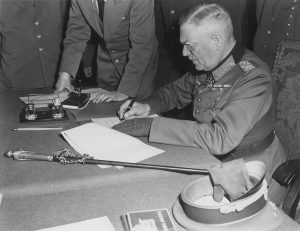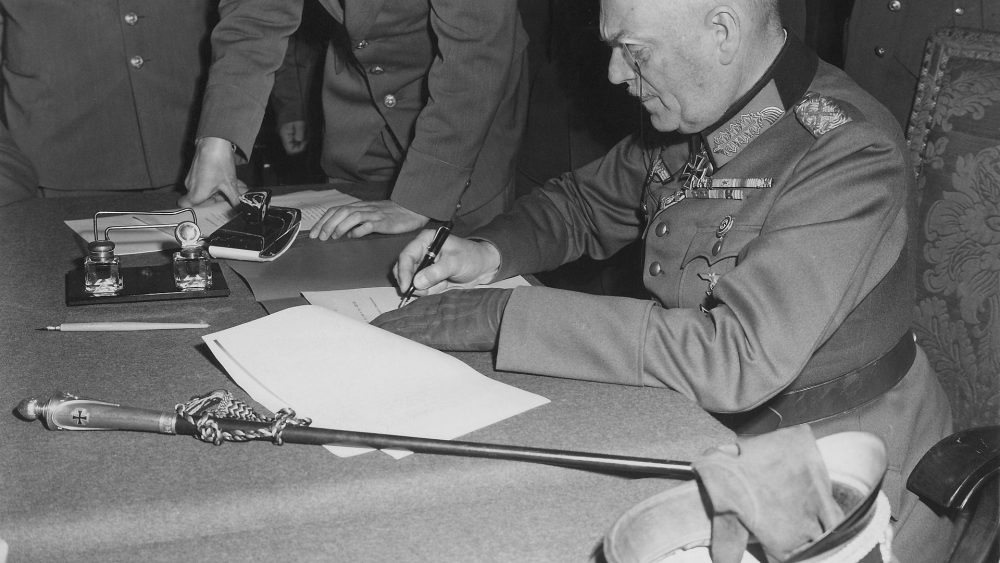Tuesday 8 May 1945, is widely known as Victory in Europe (VE) Day. Although the Second World War officially came to an end, not all Europeans celebrated the date. 8 May was experienced differently by people all over Europe. Most of them coped with everyday problems depending on the various situations they lived in: as a soldier of the German Wehrmacht or the Allied troops, as a housewife preparing a meal or living in an emergency shelter, as a survivor of the Holocaust in one of the liberated concentration camps or as a perpetrator who stood accused. Without personal documents we can only imagine what might have shaped people’s experiences of this day. But as far media coverage has been preserved, we can at least analyse what these people were told by the media of the time: reports by newspapers and the radio, news by broadsheets and loudspeakers that marked the end of the war. Of course, facts about the acceptance of the unconditional surrender of Germany’s armed forces by the Allies were inextricably interwoven with interpretations of what this event should mean for the contemporary readers, listeners and bystanders.
This is the third of three blog entries about the sonic traces of May 1945 in Britain, Germany and Sweden (authors Hugh Chignell, Hans-Ulrich Wagner and Marie Cronqvist) and the messages given by radio to the people who got in contact with them. They are radio sources from a victor, a loser, and a neutral. We consider such documents as relics of communicative processes in the past. This means that we consider them sources of past speaking and writing while looking for traces of past listening and reading historians lack so often.
These days, people in Germany can watch and listen to a long array of documentaries that all deal with the end of the Second World War 75 years ago. Since 1985 which then marked the 40th anniversary of unconditional surrender of the German Wehrmacht, the end of the Nazi government and the occupation by Allied troops, Germans have been discussing what VE Day means for them. For quite a long time, the understanding of being liberated was predominant. But right-wing voices are more and more challenging this interpretation by emphasising defeat, losses, and all the suffering in the rubble years.

Against this background, I would like to draw the attention to two radio documents of May 1945 – clips that reveal the clash of various interpretations given to the contemporary audience of May 1945.
The first document is the radio speech given by Großadmiral Dönitz on 8 May 1945. The document has been preserved at the German Broadcasting Archive (Deutsches Rundfunkarchiv, DRA) and can be listened to in its special online dossier. BBC Monitoring Transcripts reveal that it was broadcast at 12.30.
After Hitler’s suicide on April, 30, Karl Dönitz became Reichspräsident of the German Reich. He and some high-ranked military officers and ministers escaped from Berlin and fled to Flensburg, in the north of Germany on the Danish border. The transmitter and the relay station there became a small radio station from which the Nazi government could address the German audience – at that time already under control of the British troops. The speech doesn’t merely give the factual information of unconditional surrender. Germans listening to this broadcast were also told that the ‘the unity of State and Party no longer exists’. Dönitz represents himself as a noble statesman dedicated to serve the German people (deutsches Volk). He both commemorates German fortitude and martyrdom (Tapferkeit und Opfertat) and appeals urgently on German strength and will (Kraft und Wille) which shall become the basis of a peaceful Europe.
The second document corresponds with this last address by the Nazi leadership. It is a BBC reportage recorded on 8 May 1945 in Lüneburg, a city in Lower Saxony, 50 kilometers away from Hamburg. Unfortunately, this clip hasn’t been published yet, so it can’t be linked to the sound document itself.
The reportage is about the announcement of armistice in Lüneburg. “Hello BBC, this is D-Day in Germany. And here in the old town of Luneburg …” the reporter starts. The BBC journalist tells his audience that Lüneburg inhabitants had been requested to gather at the market place at 4 o’clock and to listen to their mayor. For quite a long time, the reportage transmits the German speech about unconditional surrender given from the balcony. But what makes this reportage an outstanding document is the notice of the reporter which follows at the end of the clip: “as the announcement is made, the Germans stand listening to it silently, not a comment, not a movement among the crowd… they pause for a moment and then without comment the crowd starts to disperse”. This observation reveals something about German people’s mood at the end of the Second World War. There are no methodological reasons to call into question what the reporter says about people’s reactions. So the reportage turns out to be a proof for historians stating that Germans in May 1945 were somehow emotionless, incapable of suffering and acting, without pity, without compassion, not interested in politics and plans for future as mentioned in the propaganda speech by Admiral Dönitz. The BBC reportage was obviously broadcast on 8 May 1945. It ends up with an address to its British audience: “We in the crowd in British uniform can imagine a different D-Day”, a D-Day in Britain with excitement and flags. “Here in the town square of Luneburg is the other side of the picture.” What a wonderful British-German entangled sound document!

/ Hans-Ulrich Wagner, Hamburg

